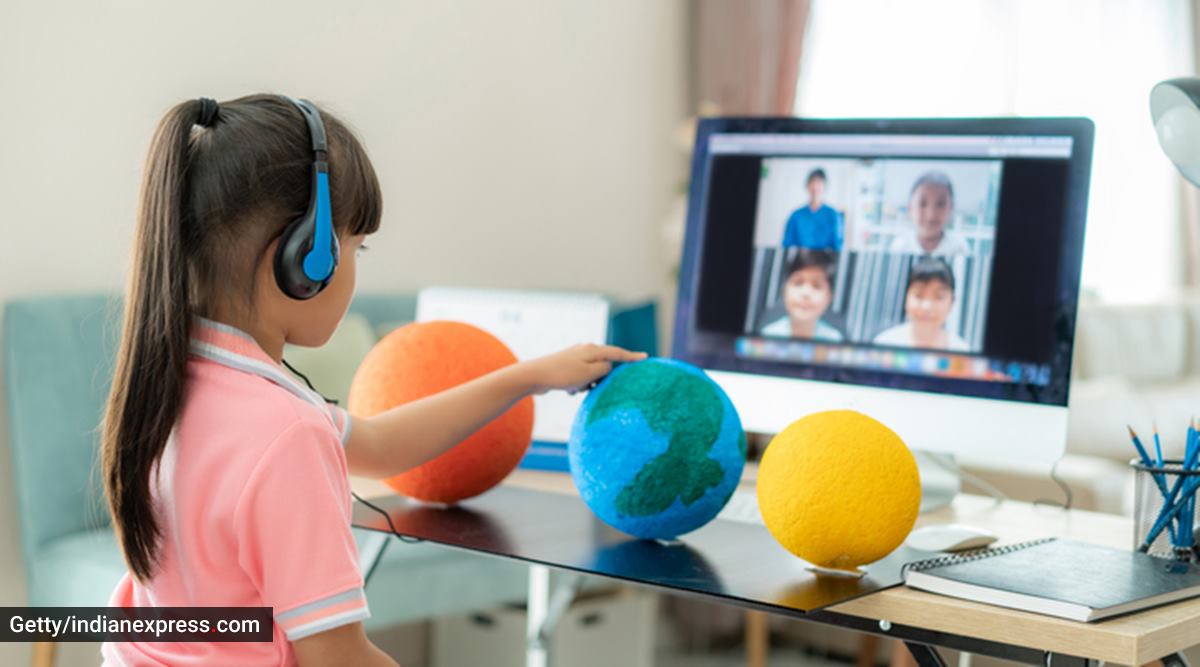Involve your child in these discussions; let them voice their concerns, their fears and see how they feel about returning to school.

By Geetika Sasan Bhandari
In all spy thrillers, there will always be one person sitting at a desk, earphones in place, forehead creased, fiddling around with a knob trying to tune in to radio chatter—intelligence gathering, in simple terms. I’ve been doing that last week, peeping into parenting groups on Facebook, trying to get a sense of what parents are feeling. The dominant ‘chatter’ right now seems to revolve around the physical reopening of school for senior classes (8-12). While the Haryana government has given the go-ahead for senior classes to open by July 16 with social distancing, the Maharashtra government is going ahead in places where there have been no active cases in the past one month; Delhi seems to be a bit more cautious with no clear directive yet, and Karnataka hasn’t yet taken a decision.
In the parent community, opinion is divided. Those who have lost family members to Covid-19 or have had multiple cases in the same house, have seen the havoc it can cause, and obviously have fears that are very real. They are against sending their kids to school, especially with no vaccination for children in sight. For them, it’s safety over everything else right now.
Then there are those who feel the pandemic isn’t ending anytime soon and kids need to have some semblance of normalcy in their lives. Especially teenagers, who are at a stage where social development is key to personality building and growth. Who need to navigate the dynamics of friendship, of peer groups, of sports clubs, and live in the real world versus the virtual world. In fact, so many of the long-term skills that children learn and need are learnt at this stage, and it does not help that peer interaction is minimal.
But, for the first time, what I’m seeing is that instead of following a herd mentality, the pandemic has made parents take complete ownership of these decisions for their family. In the past, every parent community—school WhatsApp groups, family groups, friends circles—had some dominant voices who were either the voice of reason (they read/researched and generally knew what they are talking about, evidenced by usually all-rounder kids), or the bullies (had to get a word in), or the plain not bothered/too busy/don’t know enough so let’s go with the consensus.
Not anymore. No more are families basing their decisions by just listening to other moms and dads/cousins/neighbours/grandparents. In fact, most of them are reading the news, looking at vaccine availability, keeping their own child’s personality in mind, their family/house dynamics and then deciding what they want for their family. Of course, in some cases, there will be dissonance between spouses but then that’s what parenting is all about—rationally listening to each other’s point of view to arrive at a decision that has everyone’s best interest at heart. The key learning for me has been that most parents are finally coming into their own, unafraid now of their opinion being ridiculed or them being silenced (you’ll be amazed at the politics that go on subtly and overtly in mom groups). And that’s what it should be. No two families are the same, no two kids are the same. Online classes have given parents a chance to see that their kid learns differently from say, their sister’s kid, or that their own two kids do not process, observe, absorb information the same way. One is an early riser and at his/her brightest best in the morning, whereas the other one functions better at night. But for too long, we’ve applied a one-size-fits-all parenting philosophy to our kids for most things, and the pandemic has definitely affected a shift in our mindset.
Of course, there will be apprehension, fear, anxiety—that is normal. But simply doing what everyone else is, is not working anymore. In fact, it is best to also involve your child in these discussions; let them voice their concerns, their fears and see how they feel about returning to school. If a child is particularly worried and not assuaged by your assurances, pushing them back to physical school may be damaging, so nudge but let the child take their time. On the other hand, a child who wants to go back, should, if you are satisfied with the safety arrangements. Some kids just thrive in groups and need people; they are social learners and keeping them cooped up is worse for them.
I read an article by Erin B. Burnau on parentmap.com titled ‘8 tips for post pandemic parenting’, in which Burnau writes, “…Discomfort is a place we can often learn from, but distress is a completely different beast. There is no hard-and-fast definition for this. You know your child best. But distress is marked by an inability to cope and the feeling of being overwhelmed.”
Use that to ponder. And remember, no one knows your child better than you. When you think about what to do next, that should be key. No one else needs to be in charge of your decision but you and your family. But when you do decide, also show respect to others who may decide differently.
For all the latest Parenting News, download Indian Express App.
Source: Read Full Article
